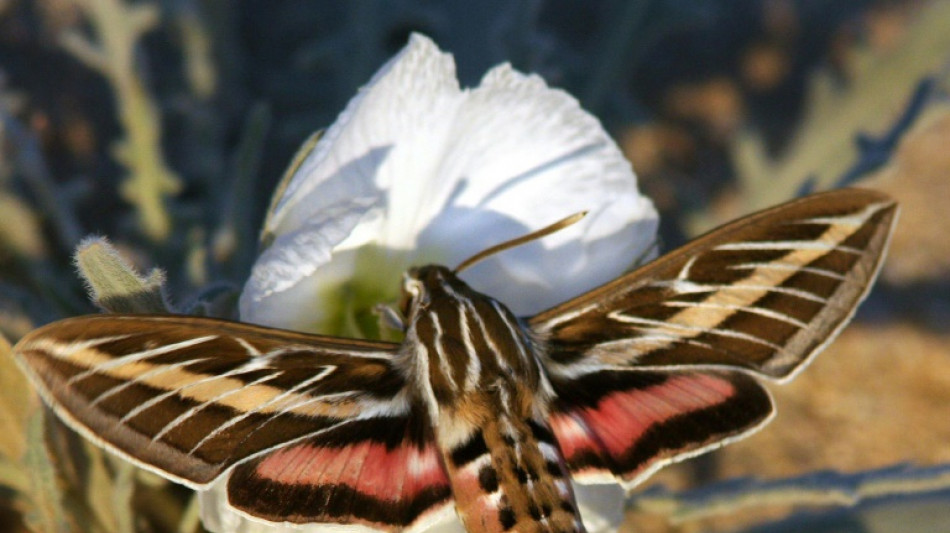
-
 LeBron back in training, edges closer to Lakers return
LeBron back in training, edges closer to Lakers return
-
Climate talks run into night as COP30 hosts seek breakthrough

-
 Germany and Netherlands lock up World Cup spots in style
Germany and Netherlands lock up World Cup spots in style
-
Germany's Woltemade hopes for 2026 World Cup spot after scoring again

-
 Germany 'send message' with Slovakia rout to reach 2026 World Cup
Germany 'send message' with Slovakia rout to reach 2026 World Cup
-
Trump unveils fast-track visas for World Cup ticket holders

-
 Netherlands qualify for World Cup, Poland in play-offs
Netherlands qualify for World Cup, Poland in play-offs
-
Germany crush Slovakia to qualify for 2026 World Cup

-
 Stocks gloomy on earnings and tech jitters, US rate worries
Stocks gloomy on earnings and tech jitters, US rate worries
-
'In it to win it': Australia doubles down on climate hosting bid

-
 Former NFL star Brown could face 30 yrs jail for shooting case: prosecutor
Former NFL star Brown could face 30 yrs jail for shooting case: prosecutor
-
Fate of Canada government hinges on tight budget vote

-
 New research measures how much plastic is lethal for marine life
New research measures how much plastic is lethal for marine life
-
Mbappe, PSG face off in multi-million lawsuit

-
 EU defends carbon tax as ministers take over COP30 negotiations
EU defends carbon tax as ministers take over COP30 negotiations
-
McCartney to release silent AI protest song

-
 Stocks tepid on uncertainty over earnings, tech rally, US rates
Stocks tepid on uncertainty over earnings, tech rally, US rates
-
Louvre shuts gallery over ceiling safety fears

-
 'Stranded, stressed' giraffes in Kenya relocated as habitats encroached
'Stranded, stressed' giraffes in Kenya relocated as habitats encroached
-
US Supreme Court to hear migrant asylum claim case

-
 Western aid cuts could cause 22.6 million deaths, researchers say
Western aid cuts could cause 22.6 million deaths, researchers say
-
Clarke hails Scotland 'legends' ahead of crunch World Cup qualifier

-
 S.Africa says 'suspicious' flights from Israel show 'agenda to cleanse Palestinians'
S.Africa says 'suspicious' flights from Israel show 'agenda to cleanse Palestinians'
-
South Korea pledges to phase out coal plants at COP30

-
 Ex-PSG footballer Hamraoui claims 3.5m euros damages against club
Ex-PSG footballer Hamraoui claims 3.5m euros damages against club
-
Mbappe, PSG in counterclaims worth hundreds of millions

-
 Two newly discovered Bach organ works unveiled in Germany
Two newly discovered Bach organ works unveiled in Germany
-
Stocks lower on uncertainty over earnings, tech rally, US rates

-
 Barca to make long-awaited Camp Nou return on November 22
Barca to make long-awaited Camp Nou return on November 22
-
COP30 talks enter homestretch with UN warning against 'stonewalling'

-
 France makes 'historic' accord to sell Ukraine 100 warplanes
France makes 'historic' accord to sell Ukraine 100 warplanes
-
Delhi car bombing accused appears in Indian court, another suspect held

-
 Emirates orders 65 more Boeing 777X planes despite delays
Emirates orders 65 more Boeing 777X planes despite delays
-
Ex-champion Joshua to fight YouTube star Jake Paul

-
 Bangladesh court sentences ex-PM to be hanged for crimes against humanity
Bangladesh court sentences ex-PM to be hanged for crimes against humanity
-
Trade tensions force EU to cut 2026 eurozone growth forecast

-
 'Killed without knowing why': Sudanese exiles relive Darfur's past
'Killed without knowing why': Sudanese exiles relive Darfur's past
-
Stocks lower on uncertainty over tech rally, US rates

-
 Death toll from Indonesia landslides rises to 18
Death toll from Indonesia landslides rises to 18
-
Macron, Zelensky sign accord for Ukraine to buy French fighter jets

-
 India Delhi car bomb accused appears in court
India Delhi car bomb accused appears in court
-
Bangladesh ex-PM sentenced to be hanged for crimes against humanity

-
 Leftist, far-right candidates advance to Chilean presidential run-off
Leftist, far-right candidates advance to Chilean presidential run-off
-
Bangladesh's Hasina: from PM to crimes against humanity convict

-
 Rugby chiefs unveil 'watershed' Nations Championship
Rugby chiefs unveil 'watershed' Nations Championship
-
EU predicts less eurozone 2026 growth due to trade tensions

-
 Swiss growth suffered from US tariffs in Q3: data
Swiss growth suffered from US tariffs in Q3: data
-
Bangladesh ex-PM sentenced to death for crimes against humanity

-
 Singapore jails 'attention seeking' Australian over Ariana Grande incident
Singapore jails 'attention seeking' Australian over Ariana Grande incident
-
Tom Cruise receives honorary Oscar for illustrious career


Noxious fumes at night aren't a pollinating moth's delight
Certain plants have flowers that open only in the evening, and depend on nocturnal pollinators such as moths to thrive.
But a new paper published in Science on Thursday finds an atmospheric pollutant that is much more prevalent at night drastically reduces the fluttering creatures' ability to track floral scents.
It adds to a growing understanding of how human activities, including not just air but also light and noise pollution, are negatively impacting the natural world.
"Our impacts on the environment are affecting human health, etc, that we tend to concentrate on, but they're also affecting ecosystem functioning through these plants and pollinators," senior author Jeff Riffell, a biology professor at the University of Washington, told AFP.
Riffell said the role of nitrate radicals (NO3) on flower scents hadn't been well studied, because the chemical is around at night and prior research focused on the impacts of pollution on daytime pollinators like bees.
Nitrate radicals form when nitrogen dioxide reacts in the atmosphere with ozone -- both of which come from burning fossil fuels, and have natural sources too.
Unlike nitrogen dioxide and ozone, however, nitrate radicals rapidly degrade in sunlight, making them virtually absent in daytime.
For their study, Riffell and colleagues chose the pale evening primrose (Oenothera pallida), a wildflower that grows in arid settings across the western United States.
Its white flowers emit a strong, piney scent that attracts the white-lined sphinx moth (Hyles lineata) and the tobacco hawk moth (Manduca sexta), species which use their powerful antennae to sniff out pollen from miles away.
- Pollinator crisis -
First, the team chemically analyzed the wildflower's scent to unravel its chemical recipe, revealing a complex bouquet of chemicals.
Next, they separated out the individual chemicals and exposed them one at a time to the moths, to determine exactly which ones were responsible for attracting the winged insects.
This revealed a subset of the chemicals, known as monoterpene compounds, were largely responsible for the scent, and further tests showed that nitrate radicals decimated the levels of these compounds.
Finally, the team carried out wind tunnel experiments involving the moths and the scent chemicals that they emitted at controlled levels from a fake flower.
"What we found is that the moths really were very sensitive to the flower scent and would kind of navigate upwind and try to feed from this artificial flower," said Rifell.
"But if we added NO3, then all of a sudden, for one species of moth, it totally eliminated their ability to recognize the flower. And for another species, it reduced their attraction to the flower by 50 percent."
The nitrate radicals were comparable to those found at night in a typical urban environment, modeled on Seattle. When the team ran the experiment with the pollutants typically present during the day, they saw far less of an impact.
Overall, the experiment revealed a strong impact on pollination activity, at a time when the world's pollinators are in crisis.
Around three-quarters of the more than 240,000 species of flowering plants depend on pollinators, and over 70 pollinator species are endangered or threatened, said Rifell.
The team also ran computer simulations to determine which parts of the world would be most likely to experience problems as a result of this effect.
Areas identified include much of Europe, the Middle East, Central and South Asia, and southern Africa.
"Outside of human activity, some regions accumulate more NO3 because of natural sources, geography and atmospheric circulation," said co-senior author Joel Thornton, a professor of atmospheric sciences.
"But human activity is producing more NO3 everywhere. We wanted to understand how those two sources — natural and human — combine and where levels could be so high that they could interfere with the ability of pollinators to find flowers."
I.Matar--SF-PST




